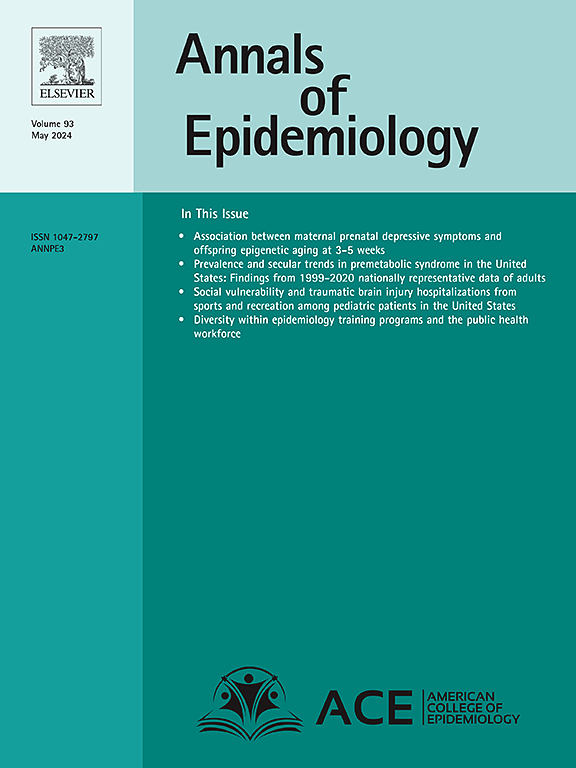低收入美国退伍军人的家庭监禁和心理保健障碍
IF 3
3区 医学
Q1 PUBLIC, ENVIRONMENTAL & OCCUPATIONAL HEALTH
引用次数: 0
摘要
家庭成员监禁是心理健康挑战的一个风险因素。然而,很少有研究调查家庭成员监禁与心理健康服务障碍之间的关系。数据来自2023年全国退伍军人无家可归和其他贫困经历(NV-HOPE)调查,这是一个具有全国代表性的样本,美国退伍军人的生活水平在 联邦贫困线的300%或以下(N = 978)。采用Logistic回归模型检验家庭成员监禁与自我报告的精神卫生保健障碍之间的关系,并对人口统计学、社会经济和兵役特征进行调整。结果总体而言,42.1 %的退伍军人报告有家庭成员被监禁。家庭成员被监禁的退伍军人报告精神卫生保健障碍的几率为1.63倍(95 % CI: 1.13-2.33)。这些退伍军人报告的心理保健具体障碍包括尴尬(OR = 2.25, 95 % CI = 1.18, 4.29)、被同伴区别对待(OR = 2.51, 95 % CI = 1.24, 5.08)、不知道去哪里寻求帮助(OR = 2.25, 95 % CI = 1.23, 4.10)、交通不便(OR = 7.01, 95 % CI = 2.99, 16.41)、难以安排预约(OR = 2.84, 95 % CI = 1.65, 4.89)和治疗费用(OR = 1.72, 95 % CI = 1.14, 2.60)。结论:家庭成员监禁与低收入美国退伍军人心理保健障碍增加有关。这些发现强调了退伍军人医疗保健项目的潜在价值,这些项目解决了心理健康准入的障碍,特别是那些有家庭成员监禁史的人。本文章由计算机程序翻译,如有差异,请以英文原文为准。
Family incarceration and barriers to mental health care among low-income US veterans
Background
Family member incarceration is a risk factor for mental health challenges. However, less research has investigated the relationship between family member incarceration and barriers to mental health services.
Methods
Data were drawn from the 2023 National Veteran Homeless and Other Poverty Experiences (NV-HOPE) Survey, a nationally representative sample of US veterans living at or below 300 % of the federal poverty level (N = 978). Logistic regression models were used to examine the association between family member incarceration and self-reported barriers to mental health care, adjusting for demographic, socioeconomic, and military service characteristics.
Results
Overall, 42.1 % of veterans reported that a family member had been incarcerated. Veterans with an incarcerated family member had 1.63 times greater odds of reporting any barrier to mental health care (95 % CI: 1.13–2.33). Specific barriers to mental health care reported by these veterans included embarrassment (OR = 2.25, 95 % CI = 1.18, 4.29), being treated differently by peers (OR = 2.51, 95 % CI = 1.24, 5.08), not knowing where to seek help (OR = 2.25, 95 % CI = 1.23, 4.10), inadequate transportation (OR = 7.01, 95 % CI = 2.99, 16.41), difficulty scheduling appointments (OR = 2.84, 95 % CI = 1.65, 4.89), and treatment cost (OR = 1.72, 95 % CI = 1.14, 2.60).
Conclusions
Family member incarceration is associated with increased barriers to mental health care among low-income US veterans. These findings highlight the potential value of programs within veteran healthcare that address the barriers to mental health access, especially among those with a history of family member incarceration.
求助全文
通过发布文献求助,成功后即可免费获取论文全文。
去求助
来源期刊

Annals of Epidemiology
医学-公共卫生、环境卫生与职业卫生
CiteScore
7.40
自引率
1.80%
发文量
207
审稿时长
59 days
期刊介绍:
The journal emphasizes the application of epidemiologic methods to issues that affect the distribution and determinants of human illness in diverse contexts. Its primary focus is on chronic and acute conditions of diverse etiologies and of major importance to clinical medicine, public health, and health care delivery.
 求助内容:
求助内容: 应助结果提醒方式:
应助结果提醒方式:


